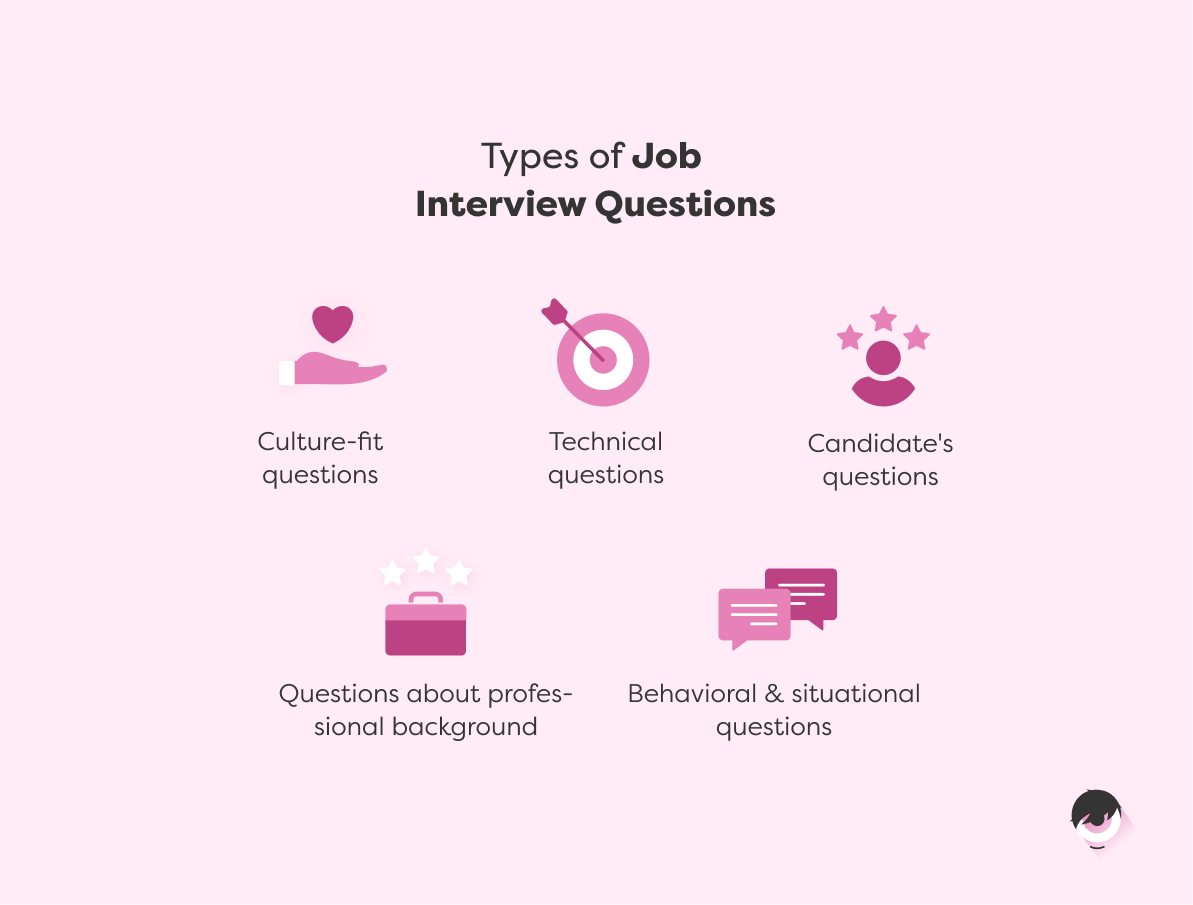Recruitment processes involve many steps that all support the same final goal: finding and attracting the best talent for the job. Of course, job interviews are crucial elements in the selection process as they help evaluate how well the candidate fits with the position. However, it’s essential to ask the right questions to ensure that the interview process positively impacts your decision and helps you choose the best talents.
In this article, you will discover examples of interview questions to ask your candidates along with tips for conducting effective job interviews. As a bonus, we have an interactive interview questionnaire you can use whenever you need!
Interview Questions You Should Ask During Your Interviews
Without further ado, here are the most important interview questions to ask your candidates. They are categorized by theme to help you structure your interview process:

Culture-Fit Questions
1) What attracted you to our company, and why do you want to work here?
2) How do you typically handle feedback from your colleagues or manager?
3) Describe a work environment in which you thrive professionally.
4) How do you handle conflicts or disagreements with team members?
5) What does a healthy work-life balance mean to you?
6) What’s one thing that motivates you to do your best work?
7) Tell me about a time when you disagreed with the company’s direction. How did you handle it?
8) How do you approach diversity and inclusion in the workplace?
9) What is your ideal management style?
10) How do you celebrate success in your team or at work?
These open-ended questions help determine if a candidate will identify with your company’s culture and share your core values. Cultural alignment is essential to ensure new hires identify with the organization’s mission and fit right into their new work environment. Click here for more culture-fit interview questions!
Questions on Skills and Expertise
11) Can you walk me through a recent project you worked on that is similar to the work you would be doing here?
12) What are the most important technical skills you bring to this role?
13) How do you stay current with industry trends and developments?
14) Tell me about a challenging technical problem you’ve solved. What was the outcome?
15) Which software/tools do you use regularly, and how proficient are you with them?
16) Can you explain a concept from your field to someone who isn’t familiar with it?
17) What steps do you take to ensure high-quality output in your work?
18) How do you prioritize tasks when working on multiple projects simultaneously?
19) Have you ever had to learn a new skill quickly? How did you approach it?
20) Tell me about a time when you encountered a technical roadblock. How did you overcome it?
Technical skills are obviously essential criteria you should evaluate during a job interview. Be sure to communicate your expectations in the job description and during the interview. This allows the candidate to showcase their range of skills related to the specific role and its responsibilities.
Questions on Problem-Solving Abilities
21)Describe a time when you had to make a difficult decision with limited information.
22) How do you approach solving complex problems? Can you walk me through your process?
23) Tell me about a project where something didn’t go as planned. How did you handle it?
24) If you were asked to solve a problem you’ve never encountered before, how would you start?
25) What’s the biggest mistake you’ve made in a past role, and how did you correct it?
26) Have you ever been in a situation where you had to think on your feet to resolve an issue?
27) How do you deal with uncertainty or ambiguity in your work?
28) Tell me about a time when you had to change your approach to achieve your goal.
29) How do you ensure you’re not only solving problems but also identifying root causes?
30) Give me an example of when you proactively identified a potential issue and took steps to address it.
Top talent is not only capable of solving issues that arise in their daily work but also of proactively identifying potential problems before they escalate. During the interview, ask detailed questions to assess the candidate’s approach to problem-solving.
Leadership Questions
31) Tell me about a time when you had to lead a team or project. How did you manage the team?
32) How do you motivate others when a project isn’t going as planned?
33) Describe a time when you had to manage a conflict within your team. How did you resolve it?
34) What is your leadership philosophy, and how do you implement it in your work?
35) How do you delegate tasks when managing a team?
36) Tell me about a time when you mentored a colleague. How did you ensure their growth?
37) How do you ensure effective communication within your team?
38) Have you ever had to work with a difficult teammate? How did you handle it?
39) How do you balance achieving your personal goals with supporting your team’s goals?
40) How do you encourage innovation and creativity within your team?
Teamwork and leadership skills are key assets to consider in your strategic recruitment. It is crucial to determine if the potential hire possesses essential qualities that support team productivity, thus contributing actively to team cohesion and, more broadly, to organizational success.
Tips for Conducting Effective Job Interviews
Here are tips to ensure that your interview questions support your strategic recruitment efforts and support a consistent and fair selection process:
1. Evaluate attitude and communication skills
Throughout the interview, you will get to know the candidate and their individual patterns. It’s important to assess whether they can adopt a positive and constructive attitude, if they appear open to dialogue, and are able to be professional throughout your discussion.
After all, their attitude and communication skills will be crucial in their daily work and relationships with colleagues. Pay attention to these signals to make the best choice for your team and organization.
2. Take notes and gather information
You should not come to the interview empty-handed: to make a good impression on the candidate and assess them effectively, you must have compiled notes from their resume and your impressions of their profile. This allows you to personalize your interview questions and conduct the conversation strategically and constructively.
It’s also essential to take notes on the responses provided by the candidate to gather insights that will guide your selection process. However, you shouldn’t spend the entire interview buried in your notes. Find a balance between active listening and information gathering to get the most out of your job interview.
3. Be flexible in your approach
The questions asked during an interview vary depending on the position, the candidate’s profile, and specific expectations. Avoid relying on a single hiring process that might discourage potential hires or skew your judgment. Instead, adjust your question models based on your needs and have a defined action plan before meeting the candidate.
Similarly, depending on how the interview goes and the direction of the conversation, don’t hesitate to ask new questions or delve deeper into a topic that caught your attention.
4. Involve the team in the selection process
Whether you are a recruiter or HR manager, it’s important to remember that the new employee will primarily work within a team and department.
If the department is already well-established, it may be helpful to consult potential future colleagues about the profile they would like to added to the team. Keep the team’s culture and objectives in mind to choose the talent that will fit perfectly into the existing puzzle.
5. Establish effective communication
While it’s crucial to assess the candidate’s attitude during the interview, you must also adopt a constructive stance and transparent communication throughout the recruitment process, including the interview, appointment scheduling, and follow-up with each of the candidates you’ve met.
Regardless of your final decision, don’t forget to send emails throughout the recruitment process and keep all candidates informed of your choice. In addition to supporting your employer branding and HR marketing efforts, effective communication at every stage of the process will ensure you don’t miss out on the perfect fit.
Asking the right questions during a job interview often makes the difference between a hasty hire and a strategic recruitment that is beneficial for the company. Did you know that Folks ATS allows you to simplify and customize all your recruitment processes, as well as your communications and interviews with candidates? Request your free demo to learn more!
Need an interactive interview questionnaire for your candidates?
Simplify your job interviews with our free questionnaire template!

